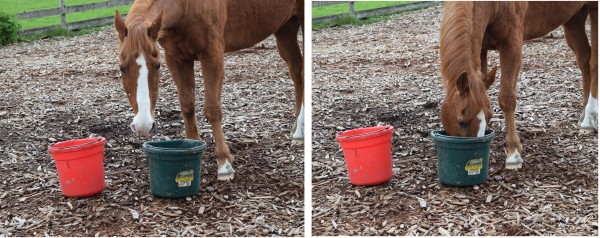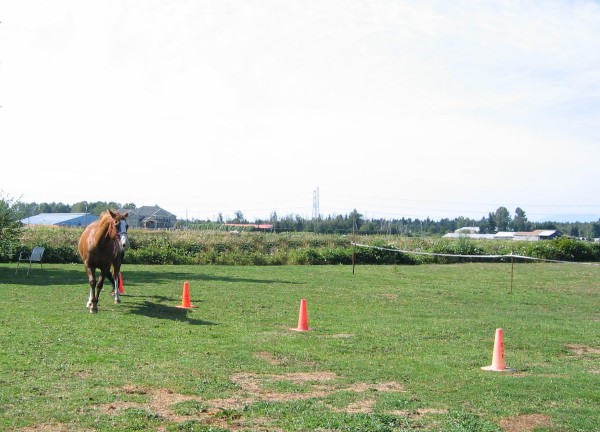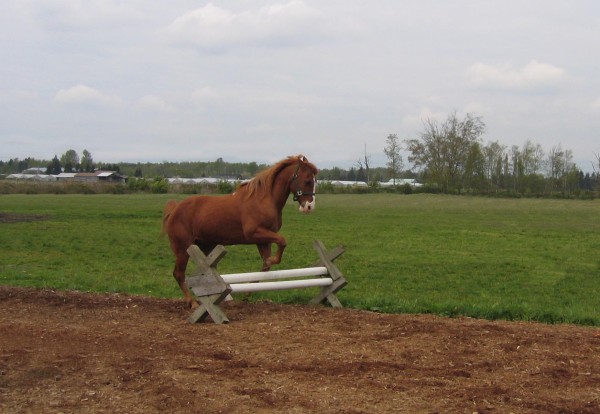Your horse’s IQ – Part 08
|
|
Der IQ Ihres Pferdes – Teil 08
|
- In discrimination tasks the horse has learned that only one stimulus, and not another, will result in getting rewarded. In the last Blog we talked about the astonishing feats of horses proving their very good memory capabilities and their ability to differentiate. It is no problem for them, for example, to recognize the distinction between a letter and the same symbol but turned up-side-down or mirrored.
- We also know that horses instantly recognize when new objects appear in their surroundings – meaning, of course, that they exactly remember how the surroundings looked before!
One more thing should be mentioned here:
Object retention:
- This is the ability to remember that an object is present, although one cannot perceive it directly any longer. Human babies develop this ability only around the age of one year – hence the amusing game where the baby covers its face and actually thinks it is well hidden from view!
|
|
- In Unterscheidungsaufgaben hat das Pferd gelernt, daß nur ein Reiz (Stimulus), und nicht ein anderer, zum Erreichen der Belohnung führt. Im letzten Blog haben wir die erstaunlichen Gedächtnisleistungen und die Unterscheidungs-fähigkeiten der Pferde diskutiert. Es ist für sie z.B. gar kein Problem, den Unterschied zwischen einem Buchstaben und dem selben Symbol in gedrehter oder gespiegelter Form zu unterscheiden.
- Wir wissen auch, daß Pferde sofort erkennen, wenn ein neuer Gegenstand in ihrer Umwelt erscheint – was natürlich bedingt, daß sie sich genau erinnern, wie es da vorher aussah!
Noch etwas sollte erwähnt werden:
Objektpermanenz:
- Das ist die Fähigkeit zu erkennen, daß ein Objekt, obwohl es gerade nicht mit der eignen Wahrnehmung erfaßt werden kann, dennoch vorhanden ist. Menschenbabies entwickeln diese Fähigkeit erst im Alter von etwa einem Jahr – daher die vergnüglichen Spiele von „Guckus-Da!“, in dem das Baby wirklich denkt, es sei versteckt, wenn es sich die Augen zuhält.
|
 Lola has NO problem remembering that I hid an apple under the bucket a while ago!
Lola hat KEIN Problem sich zu erinnern, dass ich vor einiger Zeit einen Apfel unter dem Eimer versteckt habe!
|
- If you put a bucket over an apple on the ground – the horse very well knows that the apple is still there and will turn over the bucket to get at it.
- Hiding objects from your horse and letting him discover them again is a great game – and it lies in the nature of horses, as in the wild they also constantly have to look for things.
- When a horse gets moved away, his friend calls and waits for him, where he last saw him. When my horse Czar was trucked to the vet (with a colic that sadly he didn’t survive), my other two horses refused for three weeks to get removed from the gate farther than they could see – they were very clearly waiting for his return where he vanished. It was really heartbreaking to not be able to explain his death to them, as they hadn’t got the chance to say good-bye.
Quantity:
- As we have seen in the experiment with “Clever Hans” (Blog 03 of this series), horses don’t have the ability to count, but they DO have a good idea of quantity. Try it and see, if your horse is not able, given the choice, to intuitively go for the bucket with more food in it!
|
|
- Wenn Sie einen Eimer über einen am Boden liegenden Apfel stülpen, dann wird das Pferd doch genau wissen, daß der Apfel noch da ist und wird den Eimer umwerfen, um dran zu kommen.
- Es ist ein tolles Spiel für Ihr Pferd, Gegenstände vor ihm zu verstecken und es sie finden zu lassen – UND es liegt ja in seiner Natur, denn in der Wildnis muß ein Pferd auch ständig nach Dingen suchen.
- Wenn ein Pferd verladen wird, ruft sein Freund und wartet da auf ihn, wo es ihn zuletzt gesehen hat. Als mein Pferd Czar zum Tierarzt gefahren wurde (mit einer Kolik, die er leider nicht überlebt hat), verweigerten meine beiden anderen Pferde drei Wochen lang, sich vom Tor außer Sichtweite zu entfernen – sie haben ganz klar auf seine Rückkehr gewartet, wo er verschwunden war. Es war echt herzzerreißend ihnen Czars Tod nicht erklären zu können, da sie nicht die Gelegenheit hatten, sich von ihm zu verabschieden.
Mengenbegriff:
- Wie wir im Experiment mit dem “klugen Hans” gesehen haben (Blog 03 dieser Serie), können Pferde nicht zählen, sie haben aber durchaus einen Mengenbegriff. Versuchen Sie, ob Ihr Pferd, wenn es die Wahl hat, nicht intuitiv zu dem Eimer mit mehr Futter strebt!
|
 One short glimpse – and Beau has registered, which bucket is fuller!
Ein kurzer Blick – und Beau hat erfaßt, welcher Eimer voller ist! |
- You also know that if you back your horse up for 4 steps every time, he will stop after 4 automatically – so he does keep track of the number!
- We all know that horses have an unerring instinct for time spans: bringing-in times, feeding times – no way to cheat them there! Horses have a very accurate inner clock.
- Now that Beau is almost 34, I ride him gently for only 30 minutes – and when those are up, he promptly deposits me back at the mounting block: “get off please, we are done!” (Yes, he is quite a character).
Remembering voice commands:
- It is said that horses think in pictures (read the books by Temple Grandin) and certainly they don’t think in words. I was not able to find any particular research done on exactly how horses understand words. We all agree that the horse reads our energy and body language – as prey animals their survival depends on reading the predator’s intentions correctly. (We might give word commands and not even realize how much we communicate with our body at the same time). No doubt, also the tone and intonation of our voice commands plays a significant role in how they are understood.
- I’m pretty sure that horses can remember many words – their name, “canter” and so on. In my own observation there are great differences in ability from one horse to another, and distance between me and the horse also is a factor for compliance. Beau DOES lie down on voice command only up to a distance of 6 meters – when I am further away it does not work any longer.
|
|
- Sie wissen auch, daß Ihr Pferd, wenn Sie es immer nur 4 Schritte rückwärts setzen, nach vieren automatisch stehen bleiben wird – also ist es ja über die Anzahl auf dem Laufenden!
- Wir wissen alle, daß Pferde einen untrüglichen Sinn für Zeitspannen haben: wann sie reingeholt und gefüttert werden – da kann man sie nicht austricksen! Sie haben eine sehr gute innere Uhr.
- Nun, da Beau fast 34 ist, reite ich ihn nur noch sanft für 30 Minuten – und wenn die abgelaufen sind, deponiert er mich prompt am Treppchen: „fertig! Bitte absteigen!“ (ja, er ist ein Original!)
Wortkommandos erlernen:
- Es wird behauptet, daß Pferde in Bildern denken (lesen Sie die Bücher von Temple Grandin) und sicherlich denken sie nicht in Worten. Ich konnte keine wissenschaftlichen Untersuchungen finden, die sich damit beschäftigen, wie Pferde Worte verstehen. Wir stimmen wohl alle darin überein, daß Pferde unsere Körpersprache und Energie „lesen“ – als Beutetiere hängt ja ihr Überleben vom korrekten Verständnis der Intentionen des Raubtiers ab. (Wir geben auch Wortkommandos ohne selbst zu merken, wieviel wir gleichzeitig mit Körpersprache vermitteln). Zweifellos spielt auch der Ton und die Melodie unserer Stimmhilfen eine große Rolle, wie sie verstanden werden.
- Ich bin ziemlich sicher, daß Pferde viele Worte behalten – ihren Namen, „Galopp!“ usw. Nach eigener Beobachtung gibt es große Begabungsunterschiede von einem Pferd zum nächsten, und auch die Entfernung zwischen mir und dem Pferd ist ein Faktor in der Folgsamkeit. Beau legt sich rein auf Stimmhilfe ab bis zu einer Entfernung von 6 Metern, weiter weg klappt nicht mehr.
|
 Czar (a heavier horse) retained words very well and went through the cones with directional voice commands ” right and left.”
Czar (ein schwereres Pferd) behielt Stimmkommandos sehr gut und ging durch die Hütchen mit richtungsweisenden Stimmhilfen “rechts und links.”
|
- Is breed a factor? Do heavier horses retain words better? Czar had directions (“droite” and “gauche”) down pat – Beau will NOT speak French! But if I say “we’ll do canter now” (which is NOT my command to take off, just the preparation) he does tilt his hind under and is ready to go.
- Of course every cart horse knows giddy up! And logging horses often have to work at the distance from the handlers and are known to understand many voice commands (up to 27, so I heard), especially directional ones. They also develop their own ideas of the direction in which the log must be pulled so as not to get tangled up.
|
|
- Ob Rasse ein Faktor ist? Behalten kaltblütigere Pferde Worte besser? Czar hatte die Richtungen (“droite” und “gauche”) klar kapiert – Beau dagegen wird nie französisch sprechen! Wenn ich aber sage “we’ll do canter now” (was NICHT mein Kommando ist, sondern nur die Vorbereitung), dann klappt er sein Hinterteil unter und ist bereit zum Loslegen.
- Natürlich kennt jedes Wagenpferd Hü und Hott! Und Rückepferde müssen oft mit großem Abstand zum Betreuer arbeiten und sollen bis zu 27 Stimmkommandos lernen können, vor allem richtungsweisende. Sie entwickeln auch ihre eigenen Vorstellungen davon, wie sie den Stamm ziehen müssen, damit er nicht hängen bleibt.
|
 Logging horses often have to work at a distance from the handler and are said to retain up to 27 voice commands.
Rückepferde müssen oft auf Distanz vom Trainer
arbeiten und sollen bis zu 27 Stimmkommandos behalten können. |
- Horses performing in the film industry also receive their instructions from the trainer often at a distance, which does not exclude his communication via body language, but makes it less weighty perhaps. In agility courses horses also prove that they are able to understand concepts such as “next to, under, over, through” and so on.
|
|
- Pferde, die in der Filmindustrie arbeiten erhalten ihre Anweisungen vom Trainer auch meist aus der Distanz, was desssen Kommunikation via Körpersprache zwar nicht ausschließt, aber doch vielleicht vermindert. In Agility Kursen beweisen Pferde ebenfalls, daß sie Konzepte wie „neben, unter, über, durch“ usw durchaus verstehen können.
|
 Horse Agility – Beau gets the voice command “over-the-jump!” – he has understood the concept of “over” and does not avoid the obstacle.
Pferde Agility – Beau bekommt das Stimmkommando “over-the-jump!” – er hat “über” verinnerlicht und umgeht das Hindernis nicht. |
Standard Learning Curve:
- All horses showed a standard learning curve – the more they tried, the better they got and the number of errors decreased. The more often you present them with a task and give them the time to figure out the solution by themselves, the more they “learn to learn” – and do so with a lot of motivation!
Variety is quality of life!
- Variety stimulates the thinking process and encourages curiosity. This way the horse can enhance his living conditions. We think that a horses is only truly kept according to what is best for his species, when not only his basic needs are covered, but when he also receives a maximum of possibilities to live out all of his potentials. This is the aim of enrichment programmes.
No time for this? You will never know how smart your horse really is!
- So imagine all we are missing, both horse AND rider, when we keep saying that because of our riding training we unfortunately don’t have the time for other things (like playing for example). The tradition of standard riding education leaves little room for new and creative activity and training methods. It is those however which bring to light the most astonishing characteristics of your horse, as well as unexpected further possibilities of communication between both of you.
Read on !!!
|
|
Diesselbe Lernkurve:
- Alle Pferde zeigten die gleiche Lernkurve – je mehr sie ausprobierten, desto besser wurden sie, und die Anzahl der Fehler ging zurück. Je öfter man ihnen eine Aufgabe stellt und sie diese selber mit genug Zeit lösen läßt, desto besser lernen sie „das Lernen erlernen“ und das mit viel Motivation!
Abwechslung ist das halbe Leben:
- Abwechslung regt den Verstand an und fördert die natürliche Neugier. So kann das Pferd seinen Lebensstandard erhöhen.Wir meinen, daß ein Pferd erst dann wirklich artgerecht gehalten wird, wenn nicht nur all seine Grundbedürfnisse gedeckt sind, sondern wir ihm auch ein Höchstmaß an Möglichkeiten zum Ausleben sämtlicher Potentiale bieten. Das ist das Ziel aller Enrichment (Bereicherung) Programme.
Keine Zeit hierfür? Sie werden nie wissen, wie schlau Ihr Pferd wirklich ist!
- Was entgeht uns also alles, Pferd UND Reiter, wenn wir immer sagen, daß wir wegen des Reitens keine Zeit für andere Dinge (wie z.B. Spiele) haben. Reiterliche Tradition läßt wenig Raum für neue kreative Beschäftigung und Trainingsmethoden. Gerade durch diese aber treten erstaunliche Eigenschaften Ihres Pferdes ans Licht und ungeahnte weitere Möglichkeiten der Kommunikation zwischen ihnen beiden.
Lesen Sie weiter !!!
|






